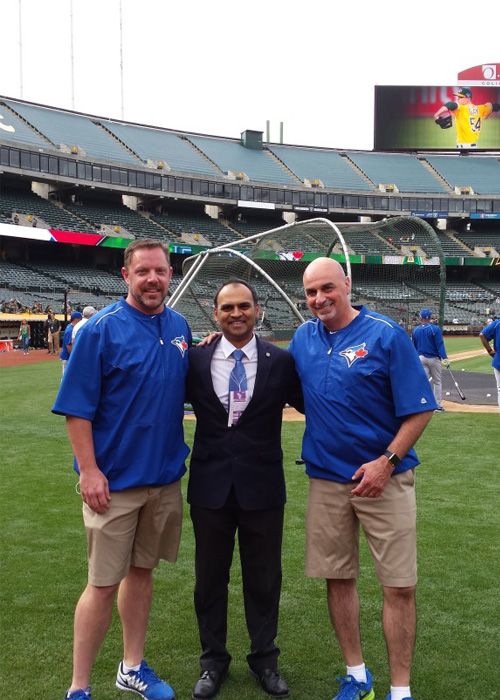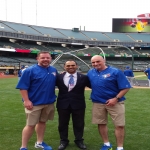
In this Q&A, we sit down with Dr. Anuruddh “A.K.” Misra, Medical Director of U.S. HealthWorks in South San Francisco. Dr. Misra is double Board Certified in Sports Medicine and Internal Medicine.
How long have you been with U.S. HealthWorks?
I started working with U.S. HealthWorks as a Medical Director in April 2014. My role with U.S. HealthWorks is primarily direct patient care, and I also oversee all the medical encounters of staff physicians, medical consultants, and mid-level providers (i.e. Advanced Nurse Practitioners and Physician Assistants) to ensure we are achieving delivery of the highest level of quality care possible.
As a Medical Director for U.S. HealthWorks, what do your further responsibilities entail?
My responsibilities include working closely with the center leadership team, which directs our Rehabilitation Department and Clinical Operations, as well as our Account Executive. This part of my job is essential to ensure the business model of our practice is in top running order from both a client engagement and financial standpoint.
In addition to working with U.S. HealthWorks, you provide sports medicine coverage for Major League Baseball teams?
I have been providing medical care to the Toronto Blue Jays since 2007 and the Los Angeles Dodgers since 2014, whenever these two teams play road games against the San Francisco Giants and Oakland A’s. I am so grateful to both medical staffs (specifically their head athletic trainers) for the opportunity to serve their sports medicine needs.
What got you interested in sports medicine? Is it a competitive specialty?
Dating back to my childhood, I have enjoyed a deep love and passion for athletics and sports, both as an athlete and as a fan. In high school I played football and tennis. I have remained active as an adult, playing tennis and basketball, and I also enjoy skiing and weight training. I have a deep, competitive nature, and my desire since high school was to merge my passion of becoming an Internal Medicine physician with my interest in sports, resulting in a strong desire for a sports medicine career. Thus, I found myself applying for this sub-specialty.
Sports medicine is a rare and rapidly growing field that it is extremely competitive. In spite of the growing number of sports medicine fellowship programs annually around the nation, it remains one of the most difficult fellowships to attain across all medical sub-specialties. It is getting more difficult to earn a position with each passing year due the exploding interest and increasingly higher qualified candidates that are applying.
What is the most exciting thing about working with pro athletes?
There is an old saying in sports that states, “We all like to win, but how many of us like to train?” To that end, one of the most exciting things about working with professional athletes is being able to pay close attention to their dedication to their craft. Very few athletes ever make it to the professional level. However, simply “making it” is not nearly enough. The point remains that hard work is essential for them to be successful and to make it from one season to the next. One of the professional athletes I spent time with actually articulated, “They pay me to practice – the games are for free.”
I was immediately reminded of the movie, The Last Samurai, when envisioning how much effort is invested before we (the public) see the final product on display. It is a profound statement because it also puts into perspective the fact that they play for free their entire career until they actually break through into the professional strata. To see these gifted athletes work as hard as they do to stay where they are in their careers has been professionally stimulating for me.
The ultimate dream come true for me has been to apply my professional expertise and acumen to their professional needs, which preserves and extends their careers.
You trained with renowned sports medicine physician Dr. James Andrews. What was that like, and how did you get that opportunity?
I trained with Dr. Andrews during my fellowship at The Andrews Research and Educational Institute (AREI) in Pensacola, Fla. Being an understudy of Dr. Andrews is nothing short of a total and complete life-changing experience. He is a celebrity physician; a superstar by the very definition of the word, and a complete tribute to our profession in countless ways. People like him just don’t “fall from the sky” into your life and career.
To be closely educated and trained by him stands out as a one of the most influential things that has ever happened in my life. Dr. Andrews possesses the unique and rare blend of elite talent, extraordinary work ethic, and unbelievable likeability. On a personal note, he is extremely generous, helpful, funny, humble and kind. As a result of my time with him, I find myself trying to make him proud of me and my career, just as I have been striving to do for my parents, wife and family over the years.
I’d be remiss not to mention how intensely Dr. Andrews wants the educational experience for all his fellows to be exceptional, and wants all of us to contribute to the field by way of research. For example, I have two research projects which I am currently working closely with him on, now nearly a year after having graduated from the fellowship.
What is the most common sports injury that you treat?
It depends on the sport. For example, in baseball the most common injuries (at least for pitchers) tend to be overuse injuries. In football and other collision sports such as hockey, trauma of all kinds ranging from broken bones and dislocations, to concussions are all commonplace – even ruptured spleens on occasion. In women’s soccer, ankle and ACL injuries are extremely common, and so are concussions. I often cover marathons and see heat exhaustion and heat stroke (though the latter is less common, thankfully), dehydration, altered mental status, severe muscle cramps and skin ailments of many kinds.
What is the most severe injury you’ve seen?
I have seen an assortment of severe injuries. To best answer your question, I’d say an injury requiring an immediate transfer to the Emergency Room would meet that threshold. I have seen a complete ankle dislocation, advanced mental status deterioration after a severe concussion, critical electrolyte disturbances, and asthma that nearly ended the life a marathoner.
How do you balance your USHW duties with your sports medicine, as well as your life outside of work?
I have been blessed with an extremely supportive family - my parents and wife have enabled me to go overseas and all over our great country for my post-doctoral training. They have provided me refuge in the face of the most challenging times of my personal and professional experiences. My family all made tremendous sacrifices for me that I someday will make for my newborn daughter. Further, I have many interests outside of medicine that keep me interested in life and offer a healthy complement to my career. These interests often result in voluntary service for nonprofit organizations that I enjoy helping out. Finally, I am mindful of burnout, and work hard to prevent it. To that end, I am quite particular about my diet, exercise and wellness because I want to be a healthy example for my family and patients.
Anything else you’d like to share with readers regarding your practice?
U.S. HealthWorks has been a true delight to work for because the position enables me to help people out in so many ways. The Urgent Care services allow for my Internal Medicine background to get considerable use and the Occupational Medicine portion of the practice enables me to use my non-operative Orthopedic/Sports Medicine background on a daily basis. There is some cross-over of skill sets for each of these practices, which makes it all the more pleasurable for me. I’m also fortunate to care for the athletes of Skyline College for all their pre-participation physicals for sports (baseball, basketball, soccer, wrestling, badminton and volleyball).
In instances where I cannot directly help a particular individual or patient for their specific needs, I am fortunate enough to know a large number of people who practice a myriad of different specialties, so I can direct those patients to trusted colleagues of mine. Come on by and visit me any time! We are located right next to San Francisco International airport.






